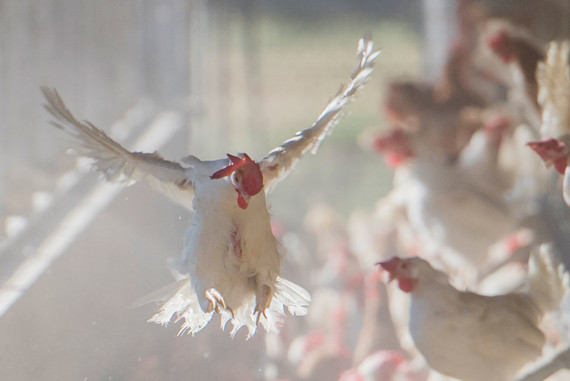After working with The HSUS, Walmart, the world's largest retailer and America's biggest food seller accounting for 25 percent of all groceries sold in the United States, announced today that it intends to source all of its eggs from cage-free sources. The policy will be fully implemented by 2025, and it will apply to the company's stores in Canada as well.
Since September, when McDonald's announced its cage-free policy, we knew that we had turned the corner in the fight against battery cages. But today, that debate ends, and the trajectory of this debate is clear. The era of confining hens in cages in America's food system is officially sunsetting.
Over the last decade, my colleague Josh Balk and I took many trips to Bentonville, Ark. to make our case to key Walmart personnel, and the team at Walmart was open and welcoming throughout the process. But given that the company likely buys more eggs than any other food retailer, and that very little egg production in the United States has been of the cage-free kind, it was not a decision it could make precipitously.
For so long, this moment seemed so distant, even as we knew we'd get there.
In the mid-2000s, we worked with colleges and universities to pioneer cage-free purchasing policies, and partnered with corporate trailblazers to follow suit, like Whole Foods and Bon Appétit Management Company.
Almost a decade ago to the day, USA Today reported on this trickle of progress. In its article titled, "Cage-Free Hens Pushed to Rule Roost," the nation's largest newspaper wrote: "A wave of colleges and universities, along with big-name employers such as America Online, food-service purveyors, restaurants and even high schools, have either eliminated or reduced their use of eggs from caged hens."
That was the start. We then conducted a series of undercover investigations to show the American public what conventional egg production looks like. They didn't much like what they saw.
Then, in 2008, we reached a game-changing moment with the passage of Prop 2 in California, with that initiative attracting more "yes" votes than any other ballot initiative in U.S. history. After that landslide election banning cage confinement in the country's fifth-largest egg producing state, we persuaded many major food companies to switch some percentage of their eggs to cage-free.
In the following years, we passed a law in Michigan phasing out chicken cages. And we worked with Ohio's agribusiness leaders and the governor to pass a regulation banning construction of new cages. Weighing in on this growing movement, the New York Times editorialized, in 2010, that "Industrial confinement is cruel and senseless and will turn out to be, we hope, a relatively short-lived anomaly in modern farming."
Indeed, that would turn out to be the case.
We continued working in collaboration with virtually every major egg buyer. In 2012, Burger King became the first major fast food brand to adopt a timeline for going 100 percent cage-free. In September 2015, McDonald's did the same, breaking the dam on the issue.
In the months following McDonald's announcement, we helped nearly a hundred major companies follow suit--including the country's largest egg purchasers like Denny's, IHOP, Kroger, Albertson's, and so many more. Our efforts were so successful that Fox News called 2015, "The Year of the Cage-Free Hen" and NPR reported that, as a result, "Most U.S. Egg Producers are now Choosing Cage-Free Houses."
There's been unyielding progress throughout 2016--leading us to today's announcement with Walmart, which provides the closing argument on the era of battery-cage confinement.
Yes, there are still some outliers, and we'll work with them to join their competitors in going cage-free. It's also important that we pass our ballot measure in Massachusetts this year to ensure a cage-free retail standard in the state. But the debate on whether cages have a future in the egg industry has been concluded, and now it is a matter of egg producers converting all of their operations over the next few years to cage-free. Consumers want this change and it will ultimately produce a much better set of outcomes for producers, food retailers, and customers alike, but most of all for the hens.
Because of the tremendous work of the HSUS team, along with our friends, including Compassion in World Farming, we can mark it down in our calendars, as a matter of historical record: April 5 was a big day indeed.
This article first appeared on Wayne Pacelle's blog, A Humane Nation.

